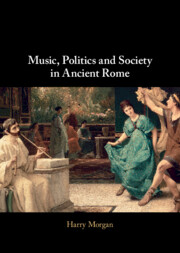Book contents
- Music, Politics and Society in Ancient Rome
- Music, Politics and Society in Ancient Rome
- Copyright page
- Contents
- Figures
- Acknowledgements
- Abbreviations
- Introduction
- 1 The Games of L. Anicius Gallus and the Cultural Politics of Music in the Second Century BCE
- 2 Popular Music and Popular Politics in the Late Republic
- 3 Augustus, Apollo’s Lyre and the Harmony of the Principate
- 4 Nero and the Age of Musomania
- Epilogue
- Bibliography
- Index
Epilogue
Published online by Cambridge University Press: 24 November 2022
- Music, Politics and Society in Ancient Rome
- Music, Politics and Society in Ancient Rome
- Copyright page
- Contents
- Figures
- Acknowledgements
- Abbreviations
- Introduction
- 1 The Games of L. Anicius Gallus and the Cultural Politics of Music in the Second Century BCE
- 2 Popular Music and Popular Politics in the Late Republic
- 3 Augustus, Apollo’s Lyre and the Harmony of the Principate
- 4 Nero and the Age of Musomania
- Epilogue
- Bibliography
- Index
Summary
This concluding chapter brings together the arguments of the four chapters in order to assess broader changes and continuities in Roman musical culture during the period under consideration in the book. While the ideological frameworks underpinning musical discourses remained largely constant over time, and competing political actors continued to use music for their own ends, it is notable that the gradual evolution of Roman society and politics prompted new types of engagement with music. This has important ramifications for our understanding of Rome’s relationship with Greek culture, as well as the interactions between elites and non-elites.
- Type
- Chapter
- Information
- Music, Politics and Society in Ancient Rome , pp. 239 - 248Publisher: Cambridge University PressPrint publication year: 2022

